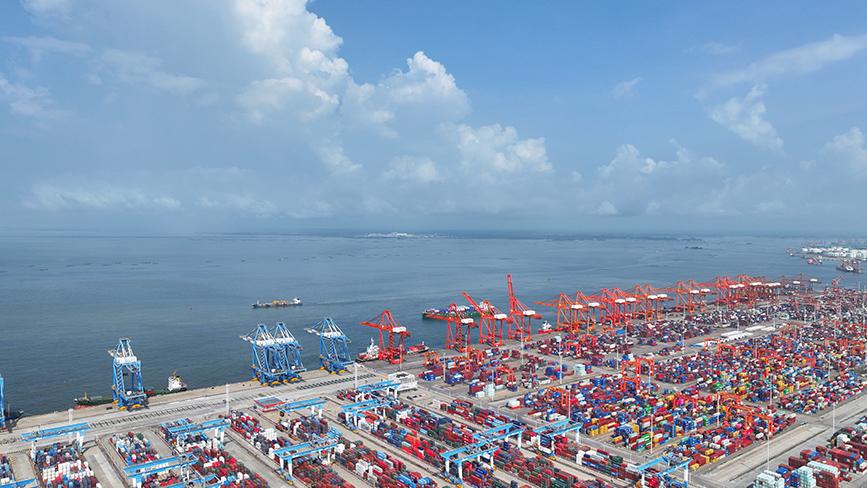Chinese robotics firms ramp up production amid accelerating commercialization
Several key players in China's humanoid robot sector have announced significant scaling of orders, signaling a major push for the development of the industry ecosystem as China continues to move closer to large-scale commercialization of humanoid robots.
Chinese robotics firm AgiBot hosted its inaugural partner conference in Shanghai on Thursday. The company revealed ambitious plans to ramp up production, with thousands of units expected to be shipped this year and tens of thousands next year, the Global Times learned from AgiBot on Thursday.
The company, also known as Zhiyuan Robotics, plans to deliver between 3,000 and 5,000 robots this year, a significant increase from 1,000 units shipped as of January this year, according to Yao Maoqing, a partner at Agibot and president of the company's embodied intelligence unit.
According to AgiBot's co-founder Peng Zhihui, the company plans to roll out hundreds of thousands of general-purpose robots within the next three years. These robots will be capable of autonomously generalizing across hundreds of tasks, establishing an open, resilient, and self-sustaining innovation ecosystem for general-purpose robots.
AgiBot's anticipated production surge reflects the eagerness among Chinese robotics start-ups for expansion amid a domestic boom in the industry.
Guangdong Tiantai Robot Co, a nationally recognized high-tech enterprise focusing on the production of robot core motion units, announced that it has signed a historic agreement for the world's first order of 10,000 embodied intelligent humanoid robots with several partners in China. The company is committed to delivering at least 10,000 humanoid robots for family healthcare by the end of 2026, the company told the Global Times on Thursday.
The partnership not only sets a new benchmark for the scale of embodied intelligent humanoid robots but also paves the way for their integration into everyday life and diverse industries, said an industry insider.
These developments come as China's humanoid robotics industry is rapidly shifting from demonstration to practical application, with major companies securing major orders and rolling out new products to meet the growing market demand, said Pan Helin, a member of the Expert Committee for the Information and Communication Economy under the Ministry of Industry and Information Technology (MIIT).
Humanoid robots in China are transitioning into practical industrial use, and are also poised to move from labs into a phase of mass production and commercial deployment, according to Du Guangda, deputy director of the department of science and technology at the MIIT, the Xinhua News Agency reported.
China's robot industry has seen rapid growth in recent years. In the first half of this year, the country's industrial robot and service robot production increased by 35.6 percent and 25.5 percent year-on-year, according to CCTV News reports.
In addition to robotics, China is also moving swiftly to develop its artificial intelligence (AI) sector.
In a bid to advance AI development of small and medium-sized enterprises (SMEs), the MIIT on Wednesday issued a document on its official website, soliciting typical application scenarios where AI empowers SMEs. This initiative aims to accelerate the innovation and development of SMEs by leveraging AI technology, driving fundamental upgrades in business models and creating new commercial opportunities, said the MIIT.
The scenarios should highlight how SMEs utilize AI technology to achieve breakthrough innovations, develop forward-looking products and services, enhance production efficiency, and fundamentally upgrade their business models, according to the document.
The move reflects the Chinese government's commitment to supporting the digital transformation of SMEs and fostering a vibrant ecosystem for AI innovation. In recent years, China has introduced policies related to scientific and technological research and development, application promotion, and industrial development, to solve major application and industrialization problems of AI, Pan told the Global Times on Thursday.
Apart from policy support from central authorities, regional innovation centers have also been established to drive technological advancements in the sector. For example, Beijing and Shanghai have set up national and local co-built innovation centers for embodied intelligent robots and humanoid robots, while provincial-level innovation centers have been established in Zhejiang, Anhui, Hubei, Guangdong, and Sichuan.
These centers aim to gather regional industrial strengths, promote technology sharing, and facilitate joint research and development between upstream and downstream players, the People's Daily reported.
Photos
Related Stories
- Interview: China carries torch for future "humanoid robot Olympics," says robotics expert
- A day in the life of a humanoid
- World's first humanoid robot games shine light on culture charm, tech applications
- First Wuzhen Youth Tech Carnival held in E China's Zhejiang
- Humanoid robot games in China spotlight global tech innovation
Copyright © 2025 People's Daily Online. All Rights Reserved.









